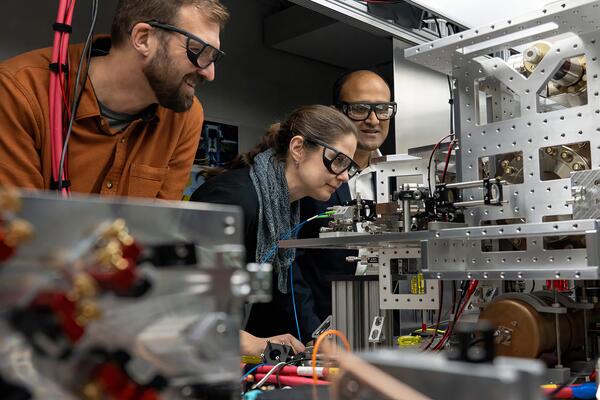
Helping people see
School of Optometry & Vision Science celebrates a historic gift that will expand access to low vision rehabilitation services in Waterloo region

School of Optometry & Vision Science celebrates a historic gift that will expand access to low vision rehabilitation services in Waterloo region
By Claire Mastrangelo Office of AdvancementThe School of Optometry & Vision Science is renaming its Centre for Sight Enhancement to celebrate a $1.5 million gift from longtime supporters George (OD ’64, DSc ’19) and Judy Woo.
This is the largest donation the School has received in its history.
“I’m deeply grateful for George and Judy’s commitment to the School of Optometry & Vision Science,” says Vivek Goel, president and vice-chancellor of the University of Waterloo. “George’s leadership in eye and vision care has made a profound impact on Waterloo and institutions around the world. I look forward to seeing patients benefit from George and Judy’s extraordinary gift.”

From left: Stan Woo, Carol Cressman, Judy Woo, President Vivek Goel, George Woo and Tammy Labreche at the Centre's naming celebration.
The Woos made their donation as part of the School’s Seeing Beyond 2020 campaign. The $35 million fundraising initiative will create the new Waterloo Eye Institute — a national resource for education and research that will expand access to eye and vision care and bring new treatments from the lab to the clinic to enhance patient care in our communities.
After a cancer diagnosis, I was faced with the reality of living with permanent damage to my vision. I couldn’t drive, read or work, and could barely function properly in society. This left me in despair. The Centre for Sight Enhancement worked with me, and provided the counselling and assistive devices I needed. They helped me learn how to live in my new world. They saved my life.”
RICK, Centre for Sight Enhancement patient
The George & Judy Woo Centre for Sight Enhancement houses the Low Vision Clinic, which provides a range of rehabilitation services for patients who have reduced vision or have lost some or all of their sight.
Low vision can be genetic or caused by diseases such as age-related macular degeneration, glaucoma, diabetic retinopathy or acquired brain injury. Patients can face challenges with learning and employability, and experience increased prevalence of falls, depression and isolation. In many cases, the loss of sight is irreversible.
Currently, one in five Canadians is at risk of losing their sight due to eye disease. With a rapidly aging population, this number is expected to double in the next 25 years and significantly increase demand for low vision services. The Woos’ gift to the Centre for Sight Enhancement will enable more patients to access multi-disciplinary care that will improve their quality of life.
“I’m delighted to contribute to Seeing Beyond 2020 by supporting a part of the School with deep personal significance,” says George. “I’ve seen firsthand the impact the Centre for Sight Enhancement has made on members of this community, and I know the Waterloo Eye Institute will build on that proud history by delivering critical services and leading research to promote eye and vision health for Canadians.”
A Waterloo alumnus and longtime faculty member in the School of Optometry & Vision Science, George co-founded the Low Vision Clinic in 1974 and was the founding director of the Centre for Sight Enhancement.
The Centre is Canada’s first and only vision rehabilitation service to be accredited by the Association for Education and Rehabilitation of the Blind and Visually Impaired. Today, it is world-renowned for its research and its unique clinical service that provides a breadth of care and rehabilitation to patients from across the province.
“On behalf of the Centre’s patients, clinicians and students, I’d like to thank George and Judy for their profound generosity,” says Tammy Labreche (BSc ’99, OD ’99), the Centre’s current director. “With the Woos’ support, the Centre for Sight Enhancement will expand services for patients living with low vision, which will significantly improve their quality of life. This is a remarkable gift to our community and Canada, and a wonderful addition to the Woos’ legacy of care at Waterloo.”

Read more
New evidence-based classification rules expand access and improve fairness for Para Cross Country and Para Alpine skiers

Read more
Waterloo Pharmacy alum spearheads outpatient oncology clinic for patients undergoing cancer treatment at WRHN

Read more
And a new model for how quantum research is shared — opening doors for the next generation of scientists and entrepreneurs
The University of Waterloo acknowledges that much of our work takes place on the traditional territory of the Neutral, Anishinaabeg, and Haudenosaunee peoples. Our main campus is situated on the Haldimand Tract, the land granted to the Six Nations that includes six miles on each side of the Grand River. Our active work toward reconciliation takes place across our campuses through research, learning, teaching, and community building, and is co-ordinated within the Office of Indigenous Relations.